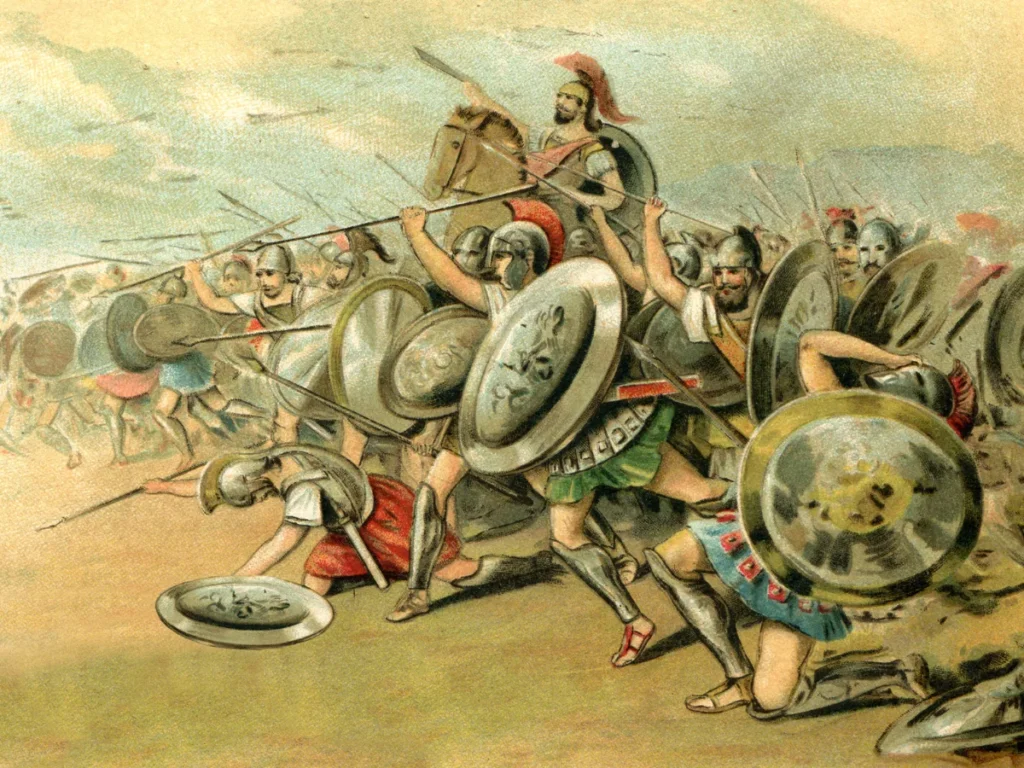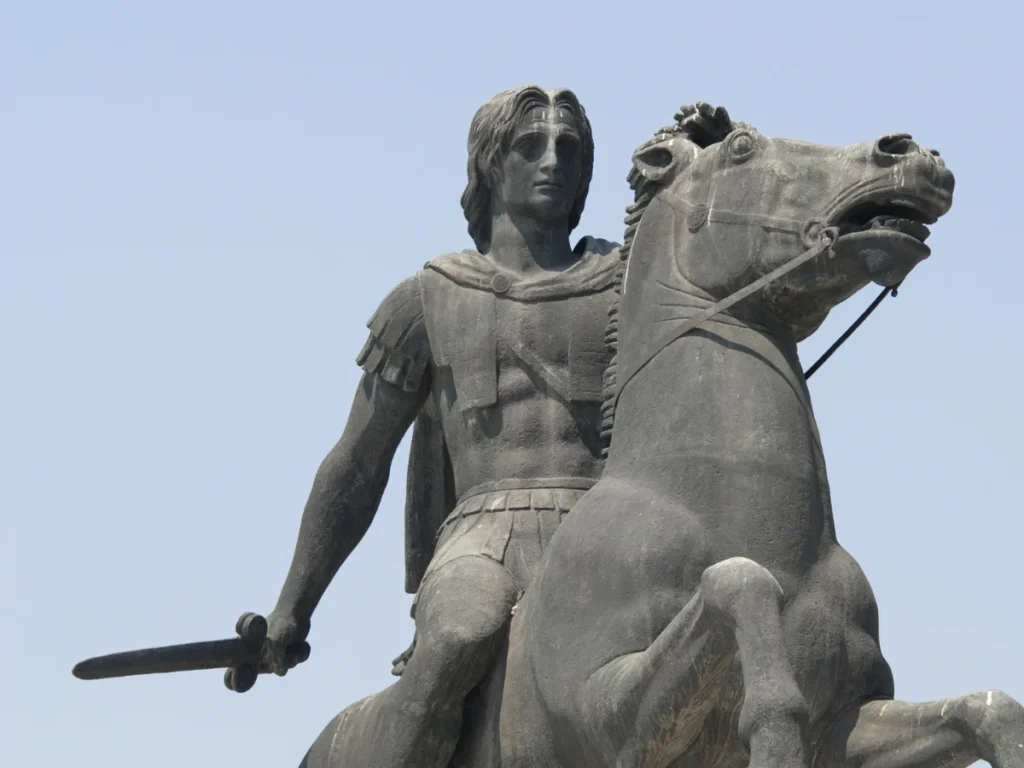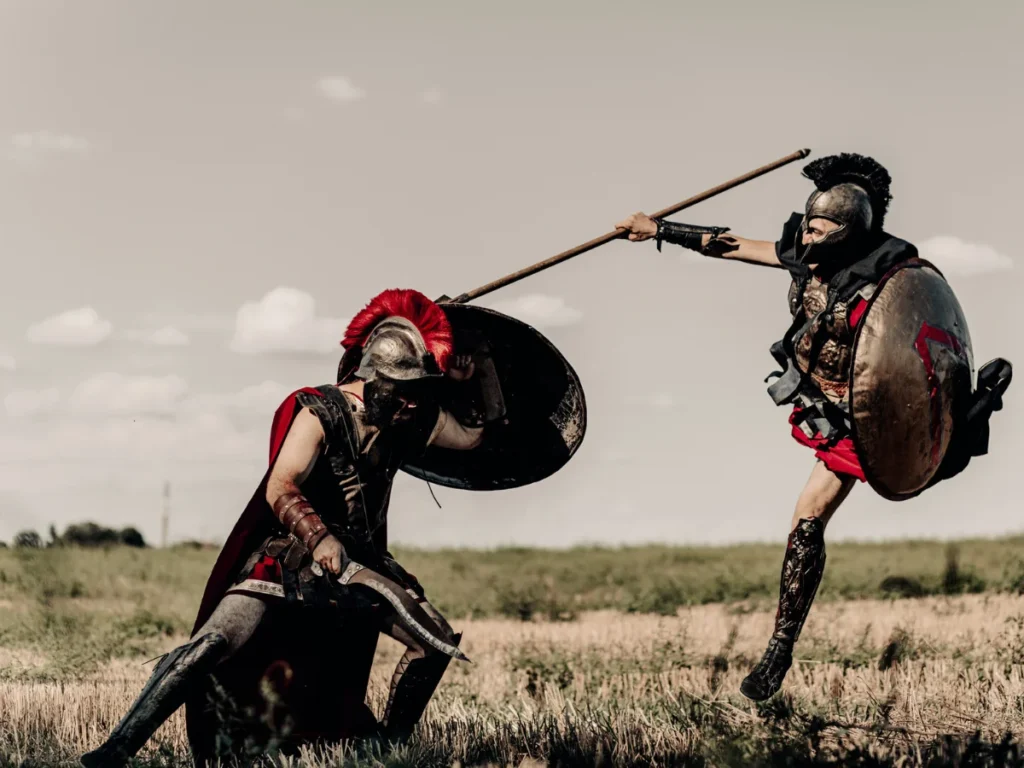Battles in Ancient Greece
There were many legendary battles in Ancient Greece. Ancient Greece, known for its rich history, witnessed numerous wars that played a pivotal role in shaping the course of this civilization. These conflicts ranged from the epic Greco-Persian Wars to the internal strife of the Peloponnesian War. The Macedonian Wars, the Wars of the Diadochi, and later confrontations with Rome further defined Greek military history. Greek warfare was characterized by innovative strategies, the formidable phalanx formation and naval expertise.

Battles in Ancient Greece: A Deep Dive into the Era of Conflicts
Introduction: Ancient Greece and Its Militarism
Ancient Greece, one of the world’s most renowned civilizations, was marked not only by philosophy, art, and culture but also by a distinct militaristic nature. This text sheds light on both the civil wars that raged among Greek city-states and the extensive conflicts with external enemies such as Troy, the Persians, and the Romans.
Civil Wars Among the City-States
Civil wars were a constant source of tension within Greece’s borders. Two of the most prominent ones were:
Peloponnesian War (431–404 BC):
Sparta and Athens, Greece’s two most powerful city-states, were engaged in a destructive conflict that had far-reaching consequences for the entire region. The war concluded with Athens’ defeat and their dominance replaced by Sparta.Corinthian War (395–387 BC):
This conflict involved multiple Greek states, with Corinth and Thebes as the primary actors. The war resulted in an unclear outcome, but it undermined Greece’s unity.
The Trojan War: An Epic Conflict
Famously narrated in Homer’s epic “The Iliad,” the Trojan War was a conflict between Greece and Troy, situated in modern-day western Turkey. While highly mythologized, this war has a strong historical basis and highlights Greece’s ability to conduct expeditions beyond its own borders.
Persian Wars: The Struggle Against the East
The Persian Wars (499–449 BC) were one of the most decisive periods in Greece’s history. The Persian Empire, under the leadership of kings Darius and Xerxes, sought to expand its dominion into Greece. At the battles of Marathon, Thermopylae, and Salamis, Greek city-states united against the Persians and achieved crucial victories, safeguarding Greece from Persian dominance.
Roman Wars: From Alexander the Great’s Conquests to Greek Subjugation
Alexander the Great, a Macedonian king, conquered a significant portion of the Eastern world, including Greece, paving the way for Roman expansion. After several conflicts and the Roman conquest of Greece, Greece became part of the Roman Empire.
Conclusion: Greece’s Militaristic History
Ancient Greece’s history of warfare was as intricate as its culture and philosophy. Civil wars, the Trojan War, the conflict with the Persians, and subsequent Roman conquest shaped Greece’s destiny and contributed to its cultural legacy. Greece’s ability to withstand external threats while remaining a source of intellectual and cultural innovation is part of its enduring heritage.



Greco-Persian Wars
Summary of Ancient Greek-Persian Wars and Alexander’s Campaigns
Introduction: A Legacy of Conflict
The history of ancient Greece is marked by a series of conflicts with the mighty Persian Empire and the remarkable conquests of Alexander the Great. This summary explores these wars, campaigns, and their profound impact on both Greek and Persian civilizations.
Greco-Persian Wars: Defending Freedom
The Greco-Persian Wars (499–449 BC) were a defining chapter in Greek history, reflecting Greece’s determination to protect its freedom. Key conflicts included:
Ionian Revolt (499–494 BC):
Greek Ionian cities, under Persian rule, rebelled but were eventually crushed.First Persian Invasion (490 BC):
The Battle of Marathon saw Greece, led by Athens, successfully repelling a Persian invasion.Second Persian Invasion (480–479 BC):
The battles at Thermopylae, Salamis, and Plataea marked Greece’s united resistance, ultimately driving the Persians out.
Alexander’s Conquests: Expanding the Greek World
Alexander the Great, a Macedonian king, embarked on a relentless campaign to expand his empire, which included parts of Persia. His remarkable campaigns included:
- Conquest of the Persian Empire (334–330 BC):
Alexander’s victories at Granicus, Issus, and Gaugamela led to the fall of the Achaemenid Empire, establishing him as the ruler of Persia.
Hellenistic Period: Greek Influence Persists
After Alexander’s death, the Hellenistic period emerged, characterized by the blending of Greek and Persian cultures in his vast empire. Cities like Alexandria in Egypt became centers of Greek culture.
Conclusion: A Complex Legacy
The ancient Greek-Persian conflicts and Alexander’s conquests left a profound legacy. Greece’s defense of freedom against Persian forces demonstrated its unity and resilience, while Alexander’s campaigns expanded the Greek world’s influence across vast territories. These events continue to influence modern understanding of the ancient world, its cultures, and the enduring spirit of human endeavor.
More Battles in Ancient Greece: Roman-Greek wars
The Pyrrhic War (280–275 BC):
Rome emerged victorious, decisively establishing its dominance over Magna Graecia, thus gaining control of the Greek colonies in Southern Italy.
The First Macedonian War (214–205 BC):
This conflict concluded with the Peace of Phoenice, marking the initial intervention of Rome in the affairs of Macedon.
Siege of Syracuse (213-212 BC):
Following a prolonged siege, Rome successfully captured the Greek city of Syracuse in Sicily, further expanding its influence.
The Second Macedonian War (200–197 BC):
During this war, Rome championed the “freedom of Greece” from the Macedonian Kings, solidifying its role as a regional power.
The Roman–Seleucid War (192–188 BC):
The Peace of Apamea concluded this conflict, reinforcing Rome’s dominance over Seleucid territories.
The Third Macedonian War (171–168 BC):
As a result, Macedonian territory was partitioned into four client republics, serving Roman interests.
The Fourth Macedonian War (150–148 BC):
Macedonia was officially incorporated into the Roman Republic, cementing Roman control.
The Achaean War (146 BC):
Corinth’s destruction and the division of Southern Greece into Roman provinces were the consequences of this war.
First Mithridatic War (89-85 BC):
During this conflict, Rome engaged in a struggle with Pontus for control of Anatolia.
Second Mithridatic War (83-81 BC):
The outcome remained inconclusive in this war between Rome and Pontus.
Third Mithridatic War (73-63 BC):
In the final showdown, Rome decisively defeated Mithridates and conquered the Pontic kingdom and Syria.
Siege of Massilia (49 BC):
The Greek city of Massilia in southern France succumbed to Roman forces during the Roman civil wars.
War of Actium (32-30 BC):
Octavian’s victory over Mark Antony and Cleopatra led to the conquest of the Greek Kingdom of Ptolemaic Egypt.
More History

Aristoteles
Aristotle, the ancient Greek philosopher and student of Plato, made enduring contributions to ethics, metaphysics, and natural sciences, shaping the foundation of Western philosophy.

King Leonidias
King Leonidas of Sparta, a fearless leader, is celebrated for his heroic stand at the Battle of Thermopylae in 480 BC, embodying Spartan valor and resilience in the face of adversity.

Cleopatra
Cleopatra was renowned for her intelligence and charisma. Her political prowess and relationships with Julius Caesar and Mark Antony continue to intrigue historians and storytellers.
